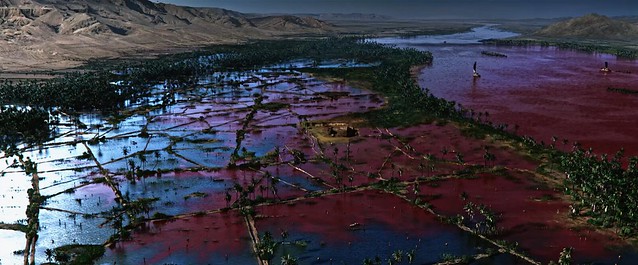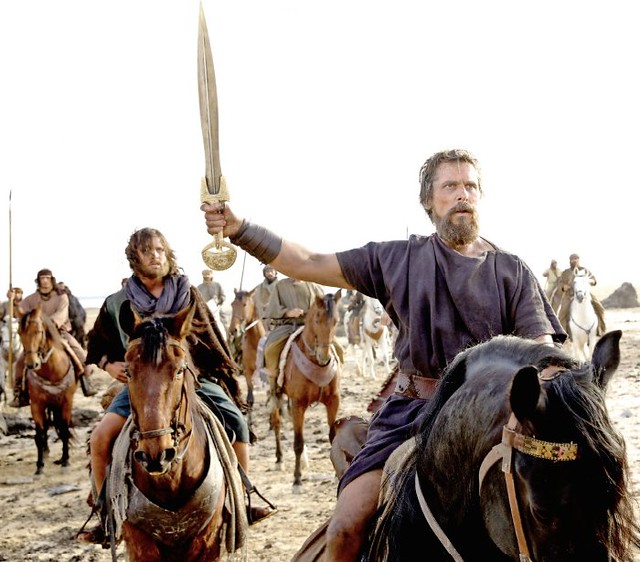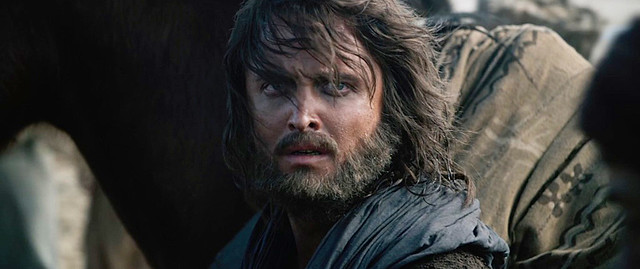
Hollywood’s been rebooting EVERYTHING nowadays! There’s reboots for sci fi films (Star Trek, Godzilla, Jurassic Park), superhero films (Superman, Spiderman, TMNT, The Crow, Fantastic Four), action movies (Terminator, Robocop) and even Disney animated films (Sleeping Beauty, Cinderella, Beauty and the Beast). But now there’s this new trend arising of re-imagining stories from the Bible. Or as I like to call them, Bible reboots.
There’s an inherent challenge Bible reboots face - on one hand, it can’t be too far from what we’ve gotten used to hearing or it’s going to sound ridiculous (Like how Noah turned the Ark story into a fantasy-war movie. Whut??). On the other hand, it can’t be too familiar that the audience loses interest. Bible stories have been retold countless times over, it’s going to be a miracle (pun intended) to add to the story something that hasn’t been told before. Fortunately, Ridley Scott’s Exodus finds that delicate balance between showing something fresh and preserving the relevant historical elements.
Exodus: Gods and Kings
follows the tale of Moses and his transformation from a highly acclaimed
prince and general of Egypt, to the leader and liberator of his people
(and his former slaves), the Israelites.

Batman V. Rhamses
First half plays out like a Pinoy soap. It has all the classic tropes of a Filipino drama – adopted sons, jealous siblings, hidden relatives within the staff, and so on. But it was a nice starting point for Moses’ tale. We get to see his protective relationship with his brother, his love for his adopted father and his general attachment to the Egyptians. You never get to see that in the kiddie school version of Moses’ story, where Egyptians are often painted as the bad guys. In Exodus, we find that Moses eventual turn against Egypt was not as clear cut as we thought.

Moses' complicated relationship with Egypt.
You also never see an incarnation of Moses as a war general; something the movie revolves much around. I don’t know why Bible reboots insist on turning everything into a war movie, but it’s a welcome change here because it actually makes sense! It makes sense for Moses to fight for Egypt since he WAS raised as its prince. Moses as a general also adds some much needed context as to how he is able to lead a people, and it plays a huge role later on as he plots against the Egyptian rule.

General Moses!
The second act is when Moses returns to Egypt as the Israelites’ liberator. This is the part most people are familiar with – the 10 Plagues, the killing of first born sons, and the parting of the red sea - and the movie is aware of that. Instead of spending too much time on the plagues, the movie glosses over them, almost to the point that it feels like they’re just things they needed to get through. And I appreciated that the miracles are downplayed to maintain a sense of realism. It was even pretty amusing watching Egypt’s “scientific experts” try to rationalize what’s been happening.
But while the movie sails through the plagues, its viciousness still resonates. The water turning into blood, the swarming of flies and locusts, the frogs, the boils, were all vibrantly brutal. And that final plague, the deaths of first born sons, was ruthless. I knew it was going to happen, but that scene with Rhamses and his boy was grotesque and heart-breaking.

One of the devastating Plagues.
Exodus is a good example of how effectively different a story can be if it shifts its focus. This version of Moses’ tale focused on Moses the soldier, more than Moses the pacifier or miracle worker or eager prophet. It breezed through the plagues, effectively giving more time to the primary character’s development. But even though that did provide a fresh and interesting perspective, my gripe with the screenplay was how quickly Moses transitioned from an unbeliever to readily going back to Egypt to do God’s bidding (and essentially opposing his former people). His about face was a bit abrupt. We see him finding happiness in a normal life, but that doesn’t explain his sudden acceptance to leave his family, confront the people he used to call his own, and free people who are practically strangers because of a vision that may or may not have been caused by a traumatic hit to the head. And given that the movie was 2 and a half hours long, I would’ve appreciated it if they had spent a bit more time on Moses’ internal struggle.

Moses holding a sword instead of his staff perfectly symbolizes the movie's approach.
Aside from this, I find it odd that most of the cast are white – Christian Bale, Joel Edgerton, Aaron Paul (Jesse!), Sigourney Weaver, John Turturro – and are all playing characters of color. Ben Kingsley is probably the only one near qualified to play a minority character. This is probably why I was never truly able to buy Bale as Moses. Bat-moses, maybe, but not biblical-Moses.

Jesse!
But those were minor gripes. There’s still a lot to enjoy about Exodus. Aside from the screenplay, Exodus Gods and Kings boasts grand set pieces (Egypt itself was stunning!), incredible attention to detail and historical accuracy (save the white casting), striking visuals effects (especially during Red Sea climax), and some great cinematography (the scene with floating bodies was just…wow).

Production quality is commendable.
Almost everyone knows the Sunday school version of this story – Moses kills an Egyptian slave runner and flees, only to be commanded by God, via the Burning Bush, to go back to Egypt and free the slaves. When you think about it, that version is fairly clean and naive. It’s refreshing that Exodus Gods and Kings presented a more nuanced view of Moses, one that pictures him as a reluctant, flawed hero. It may not have been a mind-blowing movie (years of retelling the same story will do that), but it was still a good enough one to be able to hold my attention for two and a half hours, if only for its character work and skillful film making.

No comments:
Post a Comment